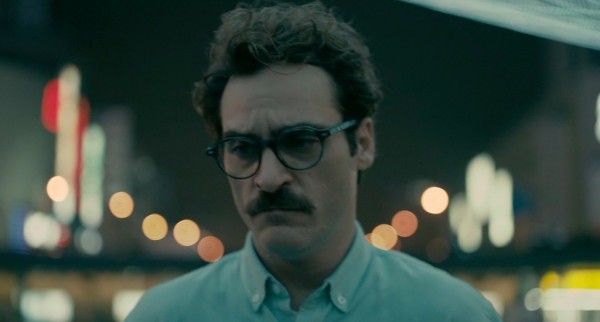Let’s just get this out of the way: I absolutely loved Spike Jonze’s Her and it’s one of the best films of 2013, probably even the best. If you’re looking for a star rating and don’t want to be spoiled on even the smallest detail of the movie, know that I’m giving it a 4.5 out of 5. Okay, now let’s get into it.
Her is about a man whole falls in love with his operating system. Only that’s not entirely accurate. The two fall in love with each other, which is a major distinction I don’t see a lot of other reviews making. It’s not hair splitting either, as a one sided love affair between a mustachioed man and his machine would make for a very different film. Little about the premise is ever played for laughs, but there’s humor and joy throughout, luckily never at the expense of the central love story.
A large part of that is due to the world building, which is on par with Jean-Luc Goddard’s Alphaville or Alfonso Cauron’s Children of Men, using existing locations to present a remarkably plausible future that may only be another ten to twenty years from now. It feels effortless, yet meticulously reasoned, with every piece of technology we currently use pushed forward to its logical conclusion. You could almost call the film “instant nostalgia,” since it trades on so many familiar visual touchstones from our modern world. It’s also a wildly humanistic vision of Los Angeles—augmented with scenes shot in Shanghai—where people walk to work, homelessness seems nonexistent and people don’t stare at their devices instead of the world around them. Technology has advanced and integrated itself in a way that, while everyone is still connected to their device, it’s no longer a social impediment.
This attention to detail is vital in allowing us to buy in to the central conceit of the movie, while also recognizing this as a world wherein Joaquin Phoenix’s Theodore isn’t strictly dependent on his operating system for companionship. If this were a grim, dystopic world, the love story wouldn’t play as such. Instead, the world both augments the giant, throbbing heart of the film, while keeping politics or other distracting factors out of the picture.
Ted is that giant, throbbing heart. We’re introduced to him in full empathy-mode as he writes a letter from the perspective of an older woman to her husband for their anniversary. That’s his job. Writing “beautiful handwritten letters” for a website with the same name. Phoenix is incredible in the role, often in close-ups with his face filling the entirety of the screen. There’s nowhere for him to hide as a performer, so he doesn’t. He plays the role with a tender sadness that slowly breaks down as he reconnects with the world around him. When we meet Ted, he’s in the final stages of a long-in-the-works divorce (he won’t sign the papers) and the layers of melancholy are all over his face from the first frame. Watching him reconnect with the world is, more than the high concept, the crux of the film and Phoenix nails it.
Even more incredible is Scarlett Johansen, stepping in for Samantha Morton, who originally played the role of the operating system known as “Samantha” on set with Phoenix. You’d never know she was the second choice, or that her performance had to fit the perimeters of work that had already been finished. Her performance is everything to the film. The life she brings to a bodiless character (an existential question she poses to herself often throughout the film) is effortless, playful and ultimately, very human. Like Phoenix, there’s never a moment in the film when her character isn’t fully realized. More than that, she’s infectious. Ted starts laughing with her almost immediately and its easy to see why. Calling a great performance by a beautiful woman “charming” seems fucked up, but goddamn it, it’s true. She’s charming on top of everything else.
This is, of course, a love story, but it’s also the best examination of “fakery” we were given in 2013. American Hustle is an empty shell game with no real interest in what artificiality actually means (beyond one monologue by Christian Bale early in the film). Her wants to know what makes the difference between a “real” and a “fake,” asking the question as often as it can and in as many different ways as it can. Chris Pratt has a supporting role as the receptionist in Ted’s office, and he loves Ted’s writing. He wants to know how Ted can write so beautifully about people he’s never met, as people he’s never met. The answer is simple: he saw a picture of the person he was writing to and used a detail about her crooked tooth in one of his letters. Like Samantha, he’s given enough of the “real” to create something that feels genuine and engenders actual emotion, not just in the letter’s recipient, but in outside characters like Pratt’s.
Can you love something that isn’t “real”? The movie has an answer and so do I. Yeah, you can. And I’m in love with this movie.
